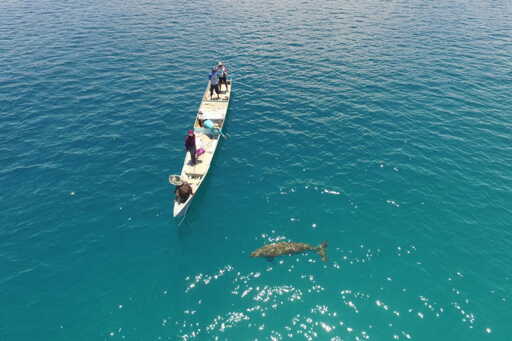A rare sighting of a baby dugong off Alor in East Nusa Tenggara has sparked renewed attention to the importance of protecting Indonesia’s seagrass ecosystems and marine wildlife. A short video was released Oct. 10 by the environmental foundation WWF-Indonesia showing the first documented appearance of a baby dugong (Dugong dugon) in the waters of Alor’s Mali Beach, where conservationists have conducted monitoring since 2016. The calf was observed swimming alongside two adult dugongs, known as Mawar (male) and Melati (female), by a member of the Kabola Fishermen Communication Forum. “I had seen the dugong calf before, but it usually avoided boats along with Melati, unlike Mawar,” Onesimus La’a, the chairman of the forum, said in a statement. Mawar, the male dugong, off Mali beach in Alor. Image courtesy of WWF-Indonesia/Alda Rizkiani. Dugongs, close relatives of manatees, are the world’s only marine mammals that feed solely on seagrass. Their global numbers have declined sharply due to hunting and the loss of seagrass habitats. With slow reproductive rates — year-long pregnancies and extended calf care — they face mounting survival pressures. Listed as globally vulnerable by the IUCN, their conservation status varies by region and can be far more critical in some areas. “The presence of two other dugongs besides Mawar proves that the seagrass ecosystem at Mali Beach, Alor, has the ecological qualities to provide habitat and food sources for dugongs,” Ranny R. Yunenin, the national coordinator for the protected and endangered marine species program at WWF-Indonesia, said in…This article was originally published on Mongabay
From Conservation news via this RSS feed


